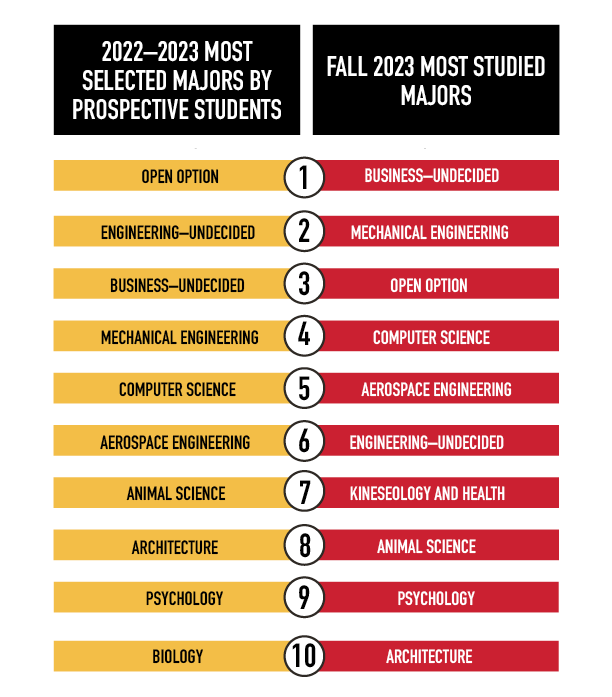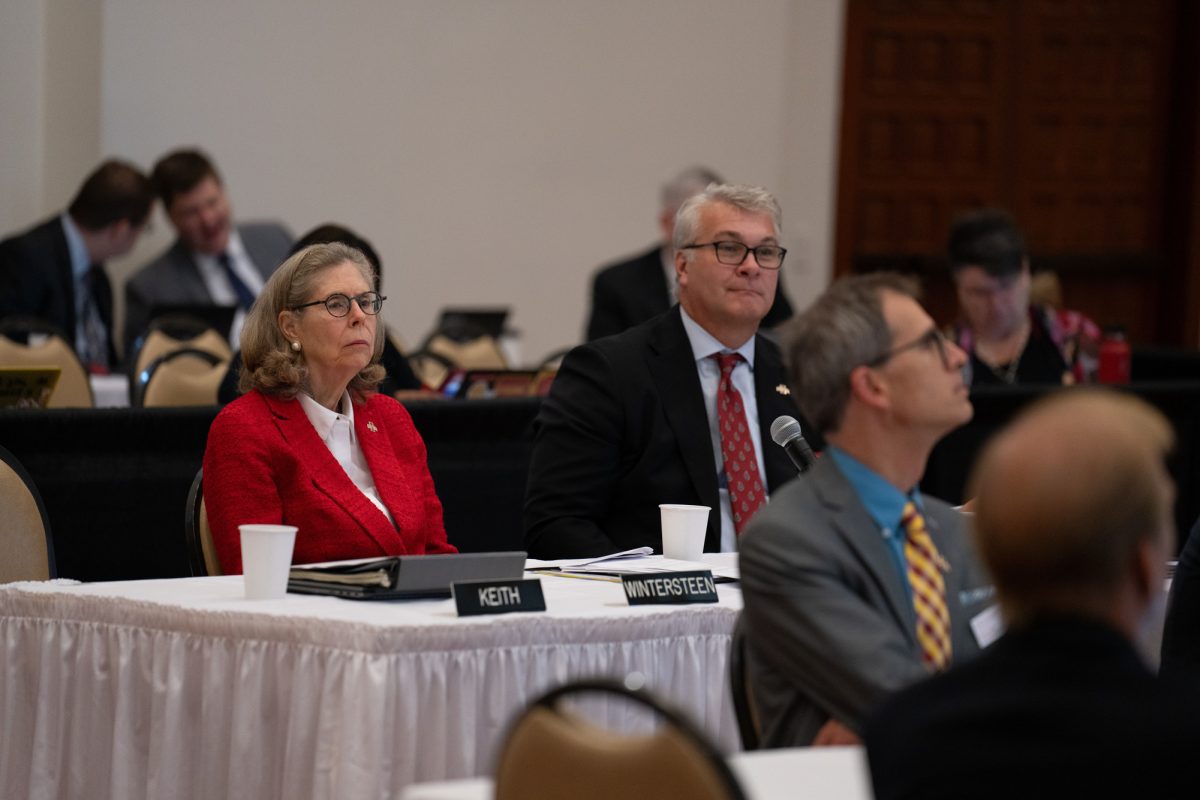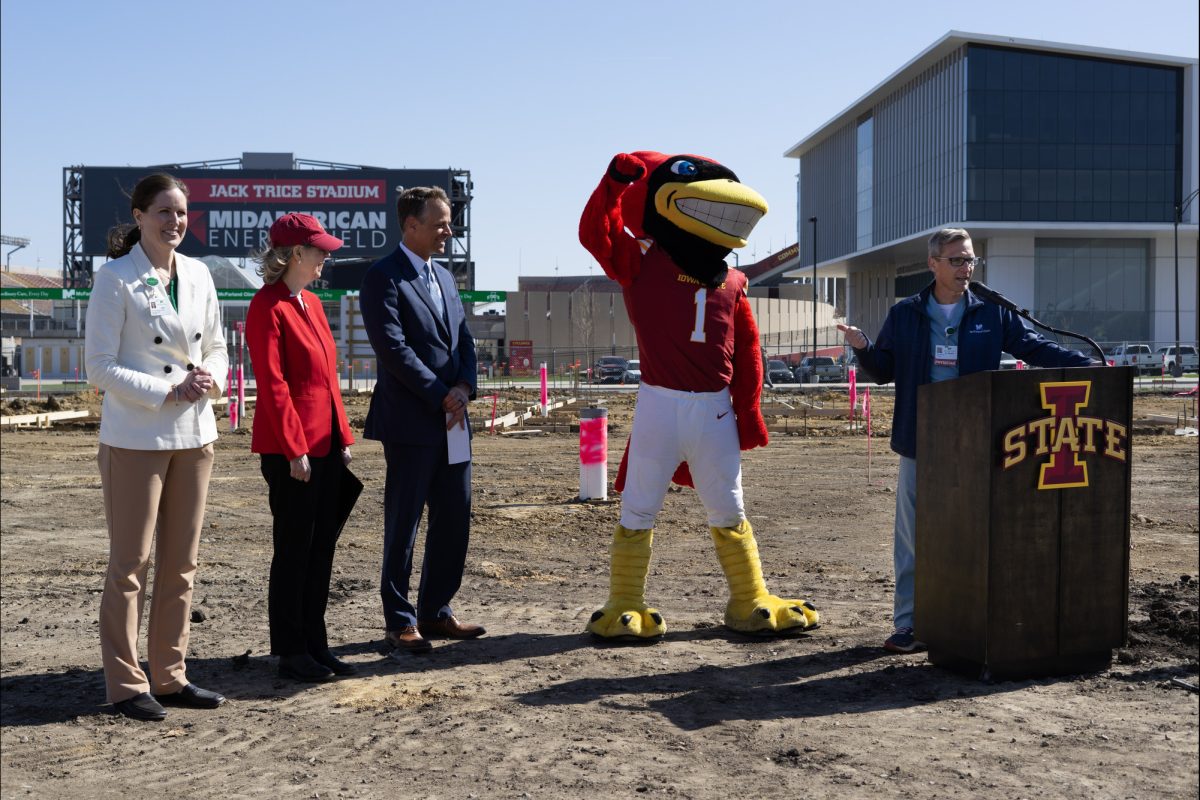First-year students are in the process of finding their fit. With this comes understanding the intricacies of completing a major, the job prospects upon graduation, opportunities for internships and more.
As a freshman student, this is a new world with plenty to learn. Between the time a prospective student tours campus and when they walk across the graduation stage, there are many factors that can lead to a major change.
Data displayed in the graphic above shows the difference between the most common majors selected by prospective students when taking part in a visit through the Office of Admissions and the top 10 most studied majors among all students at Iowa State.
The difference between the two could be attributed to many characteristics, according to campus recruiters.
Tyler Easton, director of undergraduate recruitment in the College of Business, said picking a major starts with understanding what a major entails, what jobs students can take with each degree and what the job looks like. The questions prospective students ask can start as simple as wondering what majors are offered by the university and each college within it.
“It’s not necessarily going to get articulated as a question, but ‘What majors do you have?’ That’s number one… Then a lot of it is outcomes,” Easton said.
Easton said prospective students and their parents are most curious about placement rates, employers and internships associated with each major.
Easton said some students feel the need to plan out their college career during their visit day.
“If you know what you want to do, perfect, but you’ve got time to decide. You don’t have to have it figured out. You don’t even have to have it figured out within the first year you’re in the College of Business,” Easton said.
Olivia Lorenzen, a sophomore in construction engineering, is a first-year student and started her time at Iowa State as an architecture student. Within her first semester at Iowa State, she decided that her major was not what she expected and decided to switch.
While researching Iowa State, Lorenzen said the ranking and job placement numbers for Iowa State architecture students were appealing.
After learning more about the coursework in architecture, experiencing it for herself and talking with a peer mentor, Lorenzen decided to switch from architecture to a major in the College of Engineering for a better fit for her interests.
Lorenzen said while switching, she was put in contact with an adviser and professor, who gave insight into the industry.
Learning more about each major by being on campus allowed her to make a more informed choice in what she wanted to major in.
“While learning about engineering, I learned many of the first-year classes are engineering specific, which I did not realize they were not still general eds,” Lorenzen stated in an email response to the Daily. “I also learned about how the engineering programs have many different options. For example, in the construction engineering field there are five paths I can take in just that department, and there are so many more departments.”
Lorenzen also considered learning communities and resources in the College of Engineering when deciding to switch her major.
Instances like Lorenzen’s can contribute to a shift in which majors students think they would like to major in when they visit versus the major they pursue and graduate with.
Some students in business and engineering may be interested in the other college, but it is harder to manage doing both.
Engineering hosts three of the entries on each list. Prospective students search for their major and may not know enough about majors to understand what they want to major in. That is where Easton, in the College of Business, and Deanna Harper and Alex Gustafson, recruiters in the College of Engineering, can help.
“Students coming in don’t know what they don’t know, so that’s our role is to kind of try and help them learn those things,” Harper said.
Easton and Gustafson said parents and students on visits are curious about what happens after graduation, including job placement, which factors into choosing a major.
There are students who say they are thinking about engineering but are not sure, which Harper said she directs these students to open option, which offers seminar classes allowing them to understand the options Iowa State offers.
“There are a good number of students that land in engineering in some way. Now they might get into the program and realize, ‘Well I really want more of that business mindset,’ or ‘Instead of civil engineering I really want to do architecture,’” Harper said.
Being an open option major or undecided in a college allows more comfort, Harper said.
“We comfort them in knowing that they can come in and spend their first year as undecided. They don’t have to pick on their visit day if they’re going to go into aerospace or mechanical or biomedical engineering or anything like that,” Harper said.
Gustafson said being on campus can help make the decision on what to major in.
“I think with open option being up high and then dropping down is because a lot of students, it really is once they get to campus that a lot of them are on the fence between one or two majors … Then they get two or three weeks into the semester, and it’s like, ‘Actually I do want to do construction engineering. I’m just going to declare it,’” Gustafson said.
Gustafson said she started the semester advising 30 undecided engineering students and all but three have chosen majors.














